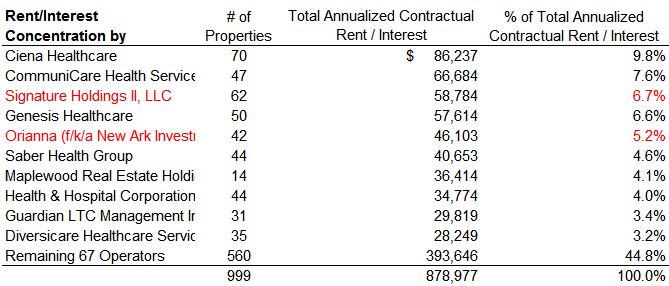Omega Healthcare (OHI) announced third quarter results last night that took many investors by surprise, sending the stock down as much as 10% in early trading this morning.
For those who are unfamiliar with the company, Omega Healthcare is a real estate investment trust (REIT) that provides financing and capital primarily to skilled nursing facilities (SNFs). In fact, Omega is the largest SNF-focused REIT and generates 84% of its revenue from SNFs.
Patients discharged from hospitals are sent to SNFs when they still require care or rehab before they can be sent home. Compared to hospitals, SNFs can provide short-term care on a more affordable basis to save healthcare costs.
Several of Omega’s tenants are under financial pressure, which caused the company to place one of them (Orianna Health Systems) on a cash basis for accounting purposes after the operator continued missing its budget and failed to pay its monthly rent obligations.
In other words, Omega Healthcare will only recognize revenue from this operator as it receives cash. Omega plans to move some or all of Orianna’s properties to new operators over the next six months or so, but annual contracted rent from the properties is expected to decrease from $46 million to a range of $32 million to $38 million once the transition is complete.
In addition to Orianna, management commented that Signature, the company’s third-largest operator (6.7% of annualized third quarter revenue), was facing liquidity challenges to pay rent on a timely basis.
Signature fell further behind schedule during the third quarter, although the vast majority of its rent due is covered by a revolving credit agreement.
Omega was also looking at deferring 10% of total rent from Signature (around 0.67% of company-wide rent) for three years, so this doesn’t seem to be a huge concern for now.
Regardless, when combined with Orianna, these two tenants accounted for close to 12% of annualized contractual rent during the third quarter.

Source: Omega Healthcare Earnings Release
Omega Healthcare also placed a non-top 10 operator, Daybreak, on a cash basis in September due to a short-term liquidity crunch the company faced; however, Daybreak is expected to pay full rent starting in January and is not comparable to Orianna’s situation.
Signature does have a restructuring plan in place that involves some potential asset sales, and management is taking more powerful steps to right-size performance with the Orianna portfolio, but it’s discomforting to know that important tenants are struggling.
That’s especially true in light of fears that have surrounded the SNF industry for several years. More specifically, skilled nursing generally has higher reimbursement risk than other areas of healthcare because SNFs depend more on Medicare and Medicaid reimbursements from the government.
In fact, private pay only accounted for 12.2% of Omega’s operator revenue mix as of June 30, 2017, with Medicaid (51.9%) and Medicare / Insurance (35.9%) accounting for the remainder.
As a result, changes in federal policies and increased scrutiny over billing practices of SNF operators have potential to materially impact the ability of Omega Healthcare’s tenants to meet their lease obligations.












Leave A Comment